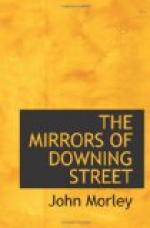Mr. Churchill has not convinced the world of this possession. He carries great guns, but his navigation is uncertain, and the flag he flies is not a symbol which stirs the blood. His effect on men is one of interest and curiosity, not of admiration and loyalty. His power is the power of gifts, not character. Men watch him, but do not follow him. He beguiles the reason, but never warms the emotions. You may see in him the wonderful and lightning movements of the brain, but never the beating of a steadfast heart. He has almost every gift of statesmanship, and yet, lacking the central force of the mind which gives strength and power to character, these gifts are for ever at the sport of circumstance. His inconsistencies assume the appearance of shifts and dodges.
There is one particular way in which I think his inconsistencies have been dangerous to his career. They have brought him too often into inferior company.
Lord Northcliffe, with all his faults, is a man to whom statesmen may speak their minds without loss of influence, but there are other newspaper proprietors, financiers of commercialized journalism, with whom a man of Mr. Churchill’s power and position should hold no personal relations. His is a mind which stands in need of constant communion with men of culture and refinement. He knows the world by this time well enough, what he does not know are the heights. His character suffers, I think, from association with second-rate people. He is too heedless of his good name.
Is it too late for him to acquire strength of character? His faults are chiefly the effects of a forcible and impetuous temperament: they may be expected to diminish as age increases and experience moulds. But character does not emerge out of the ashes of temperament. It is not to be thought that Mr. Churchill is growing a character which will presently emerge and create devotion in his countrymen. Character for him must lie in those very qualities which are now chiefly responsible for his defects—his ardour, his affectibility, his vehemence, his impetuous rashness, his unquestioned courage. One thing only can convert those qualities into terms of character, it is a new direction.
There is perhaps only one other man in the present House of Commons who could do more than Mr. Churchill for his country and the world. All Mr. Churchill needs is the direction in his life of a great idea. He is a Saul on the way to Damascus. Let him swing clean away from that road of destruction and he might well become Paul on his way to immortality. This is to say, that to be saved from himself Mr. Churchill must be carried away by enthusiasm for some great ideal, an ideal so much greater than his own place in politics that he is willing to face death for its triumph, even the many deaths of political life.
At present he is but playing with politics. Even in his most earnest moments he is only “in politics” as a man is “in business.” But politics for Mr. Churchill, if they are to make him, if they are to fulfil his promise, must be a religion. They must have nothing to do with Mr. Churchill. They must have everything to do with the salvation of mankind.




